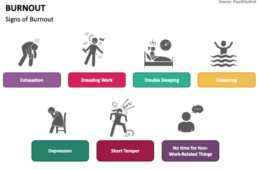Managing Burnout in the Workplace | Are Your Leaders Fully Equipped to Face It?
In today’s fast-paced world, managing burnout in the workplace is a priority. The demand on our time has increased significantly, meaning practical strategies to mitigate this have become ever more important.
From work to family responsibilities, we’re constantly juggling multiple tasks at once. A recent chart created by Our World in Data highlights how Americans spend their time by age. Beyond mere statistics, this chart has significant real-world implications for managers and leaders, especially those in the 40% who attain their first managerial position between the ages of 25 and 30.
Have you heard about "Mattering"
Rethinking the Link between Well-being, Productivity, and "Mattering".
After reading the article about “Mattering” published by the World Economic Forum following this year's event and the response from Jemima Kelly from the Financial Times, I have a lot of questions and thoughts that have come up. Whilst I do believe the objective of making sure every individual feels valued in their job, I am still questioning the causal relations between, Wellbeing, Productivity, and “Mattering”.
How to Successfully Manage Employee Burnout
It’s easy to get caught up in the day-to-day operations of a business and miss possible underlying issues. One such potential problem that can have a major impact on your organisation is employee burnout.
Read more
7 Ways You Can Improve Your Company Culture | Impactful Ideas for Individuals
Following recent articles from Forbes, The Times, and BBC News on the topic, it’s clearly time for businesses to consider new ideas to improve their company culture.
As a response to the additional difficulties presented by remote work and the transition back to working in an office environment, companies are investing significant amounts of money in developing their company culture. While these efforts are both commendable and necessary, it’s important to remember that every individual employee has a role to play in creating and maintaining a positive work culture.
What Is Company Culture?
The culture of a business isn’t something that can be easily defined or changed.
It’s the sum of every employee’s behaviours, actions, and attitudes, which create a shared sense of identity and values within an organisation. Each individual contributes to the overall culture through their interactions with colleagues, work habits, and communication styles.
For example, if employees consistently demonstrate high levels of professionalism, respect, and collaboration, the culture of their company will likely reflect those values.
On the other hand, if employees engage in negative behaviours such as gossiping, withholding information, or refusing to work as a team, the culture of their organisation will likely become toxic and unsupportive.
Of course, it’s important to note that culture is not created in a vacuum. External factors such as industry trends, social norms, and the competitive landscape can also have an influence. However, the behaviours and attitudes of employees remain a critical component in shaping and improving company culture.
How to Improve Company Culture
The purpose of this article is to explore the concept of corporate culture, as well as the importance of individual responsibility in creating a positive working environment.
Remember what John F. Kennedy once said:
“Ask not what your country can do for you; ask what you can do for your country.”
Ultimately, our aim is to inspire readers to become actors of change in their own workplaces, thus creating a better culture for both themselves and their colleagues.
Creating a virtuous cycle of interactions - based on what some might consider old-fashioned ideas! - can have a profound impact on the culture of a business. The collective behaviours of every individual in an organisation contribute to the creation of its true culture, which in turn is reflected in how the outside world perceives it.
Here Are 7 Ways You Can Improve Your Company Culture:
- Assume positive intent: Assume that your colleagues, team, or boss have good intentions, even if you don’t always agree with them. This will create a more positive working environment.
- Rediscover the true meaning of commitment: When you give your word that you will do something, focus on delivering on time, every time. Building trust through consistent delivery is key to creating a supportive workplace.
- Engage in meetings: Be focused and prepared for meetings. Engage actively and contribute constructively to encourage productivity.
- Develop a can-do attitude: Ensure that you understand what you are supposed to do and when by asking clarifying questions where necessary. Take ownership of your responsibilities and strive to achieve them to the best of your ability.
- Don’t set others up for failure: Support your colleagues by sharing information and resources. Work collaboratively to achieve shared goals.
- Respect others’ time and space: Be mindful of your colleagues’ schedules and avoid wasting their time. When you respect their boundaries and space, they will often return the favour
- Anticipate and adapt: Be flexible and adaptable to changing circumstances. Anticipate potential challenges and be proactive in finding solutions.
These behaviours contribute to the collective good and are essential for improving individual well-being and productivity. By facilitating a culture of respect and trust, businesses can foster a nurturing and sustainable working environment, thereby improving their company culture.
For more information about how Avilio could help you and/or your organisation, please don’t hesitate to reach out to our founder, Philippe.
Alternatively, why not read our guide on understanding the signs of employee burnout?









